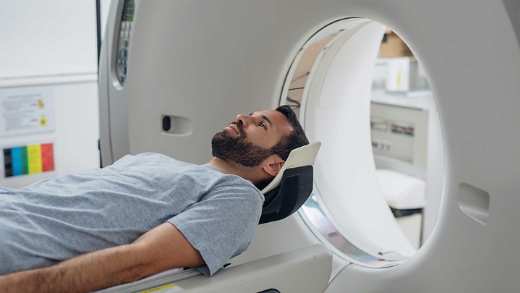What to expect when you have a CT scan
A CT scan combines a series of X-ray images to provide a cross-sectional view of bones and soft tissues inside your body to identify internal abnormalities.

What is a CT scan?
A CT scan (computerised tomography) is a commonly used test that uses a series of X-rays and a computer to generate cross-sectional images of the inside of your body. You’ll sometimes hear it called a CAT scan but it’s the same x-ray procedure. A CT scan is generally painless and millions are performed every year in the UK.
Purpose of a CT scan
There are many reasons you may be offered a CT scan. Doctors use them to diagnose conditions including damage to bones, injuries to internal organs and problems with blood flow, stroke and cancer.Footnote [1]
If you have a condition that your doctor wants to monitor they may order a series of CT scans. It means they can assess your condition over time and plan the right treatment for you. Along similar lines, you may have a CT scan for doctors to use as a guide when planning surgery.
Preparing for a CT scan
Depending on what part of your body is being scanned you might be asked to not eat or drink anything for several hours before your appointment. If you’re having your large bowel scanned you may be given laxatives to take or a special diet for a couple of days before the procedure.
When you arrive at your scan you may be asked to change into a medical gown, depending on which part of your body is being scanned. The radiographer may ask you to remove jewellery, hearing aids or anything else that could have metal in it. Metal doesn't directly interfere with the equipment, but it can lower the quality of the images produced and make it difficult for your doctor to accurately interpret the scans.
A CT scan with contrast dye
You may be given a contrast dye before the scan in the form of a drink, or as an injection into a vein. This helps highlight the areas of the body that need to be examined.
If you're drinking the contrast dye, instructions will be provided by your healthcare professional.
Injected contrast can give you a metallic taste in your mouth and might make you feel warm for a short time. You may also feel as though you need to use the toilet.
CT scan procedure
For the procedure you’ll be carefully positioned and made comfortable on a motorised scanner table, usually flat on your back. The scan takes between 10 and 30 minutes, or more depending on the type of scan being performed.
You’ll pass into the scanner, which is a ring, shaped like a large doughnut on its side - if you’re prone to feeling claustrophobic, you don’t need to worry, as the scanner doesn’t surround your whole body at once like an MRI scanner.
The radiographer will be in another room operating the scan. They can speak to you and may ask you to breathe in and out, or hold your breath at certain times. It is important to follow any instructions you are given to ensure the scan is of the best possible quality. This will help your doctor devise the best treatment plan. If you need to ask a question or need some reassurance, you can speak to the radiographer through an intercom.
Afterwards you may be asked to wait for a short time before leaving for the technician to check you are feeling well. If you’ve had contrast dye you may be told to drink lots of fluids to clear your kidneys.
CT scan risks
CT scans involve exposure to ionising radiation, which can pose certain risks. The amount of radiation exposure from a CT scan varies depending on the type of scan. Doctors are responsible for weighing the benefits of CT scans against any potential risks, while radiographers ensure that radiation doses are kept as low as possible. If you have any concerns about the risks associated with CT scans, it is a good idea to discuss them with your healthcare provider.
When undergoing a CT scan that uses contrast dye, you will be asked about allergies because contrast agents can sometimes cause allergic reactions.
Alternatives to CT scan
Depending on your condition, your doctor may offer an alternative form of imaging. This may include ultrasound, MRI or X-ray.
MRI scans provide greater detail in soft tissue structures than CT, making it useful for imaging the brain, spinal cord, muscles and joints.
Traditional X-ray imaging may also be advised. X-rays are a type of electromagnetic radiation that is absorbed differently by various tissues in the body to create images. They are most commonly used to examine bones and joints.
You can use your cover to pay for your CT scan
If a CT scan is recommended by the specialist for the condition you have, then benefit may be available based on your policy terms.
It’s quite straightforward to claim using your health insurance cover. Once your specialist has decided to refer you for one you can make a claim through MyAviva, over the phone, or online.
Once we’ve confirmed your claim meets the terms of your policy, we’ll pay for the scan directly. Just be sure to tell us if you need more tests or treatment, or if your hospital or specialist changes.
It’s good to have one less thing to worry about. It takes Aviva.
Next article
Worried about GP and hospital wait times?
Here's how quickly you could get treated with health insurance.



